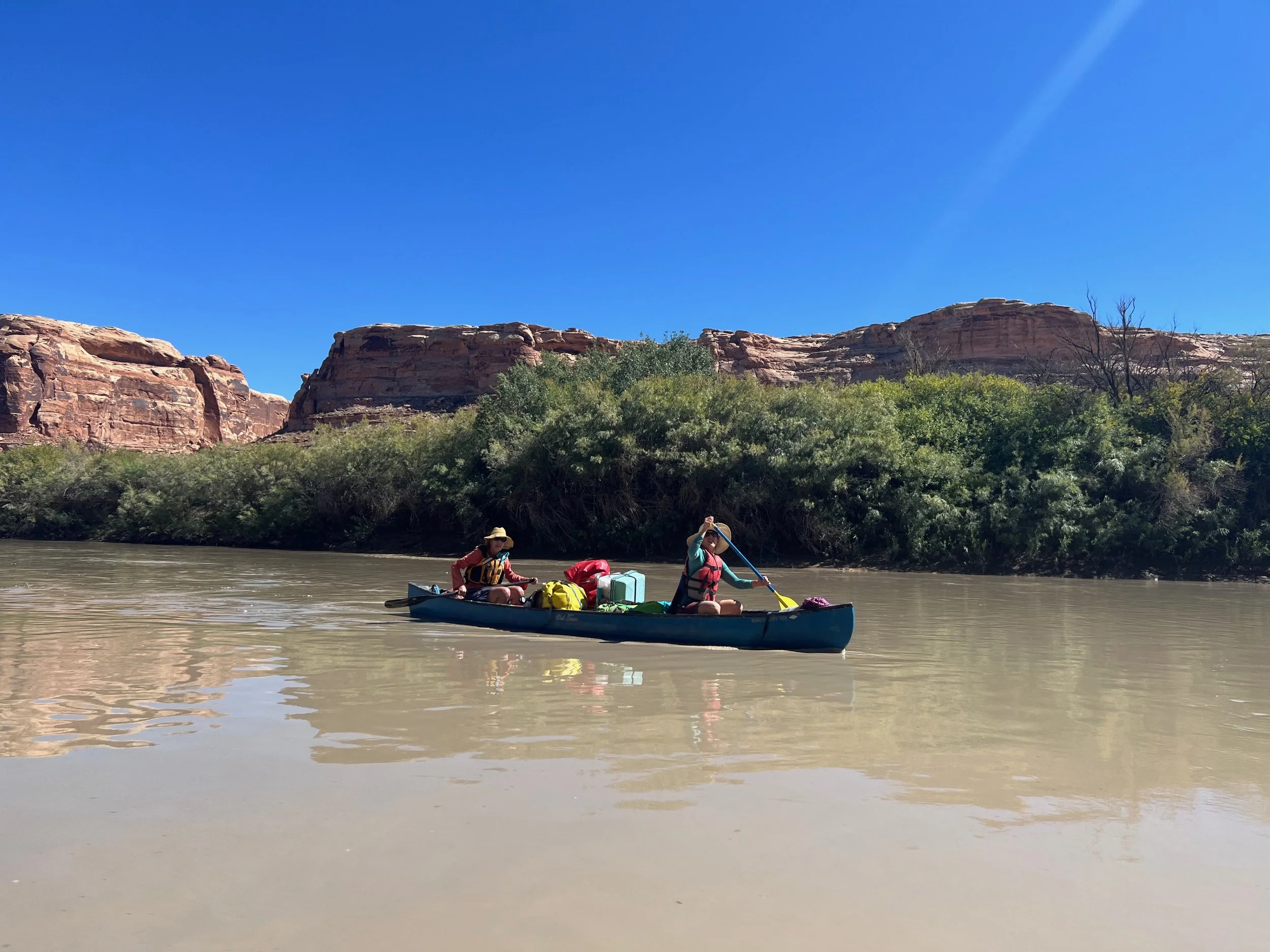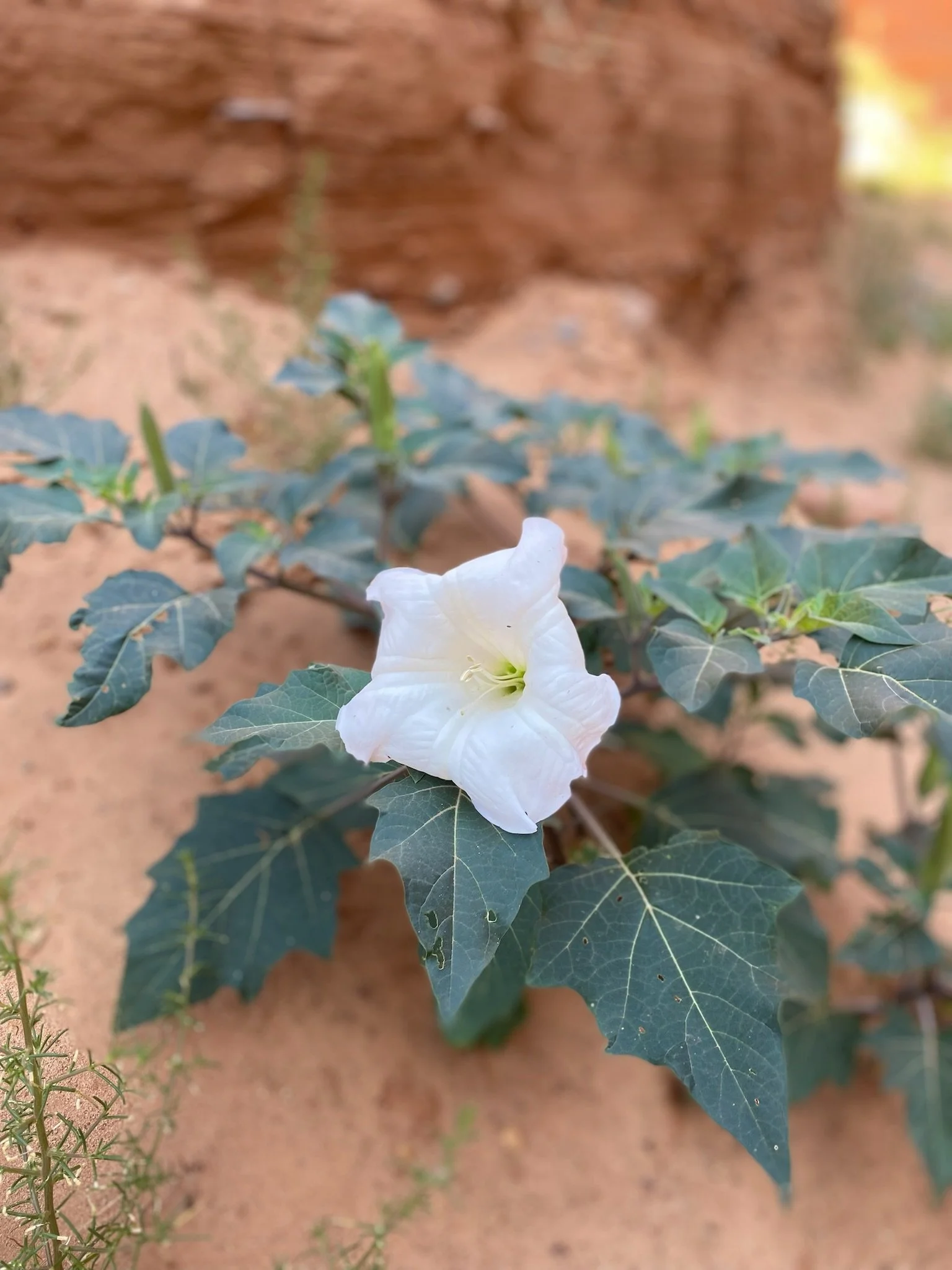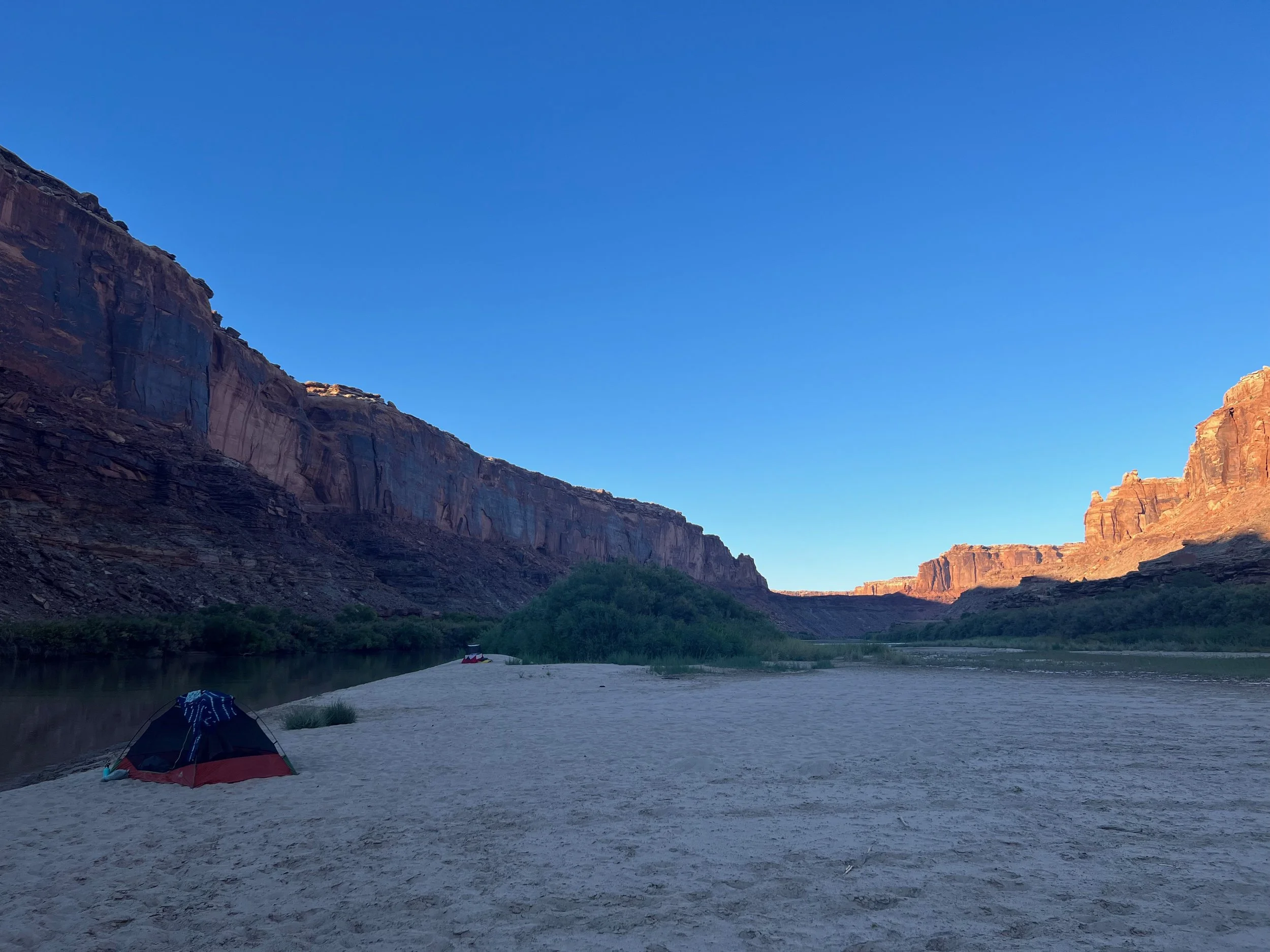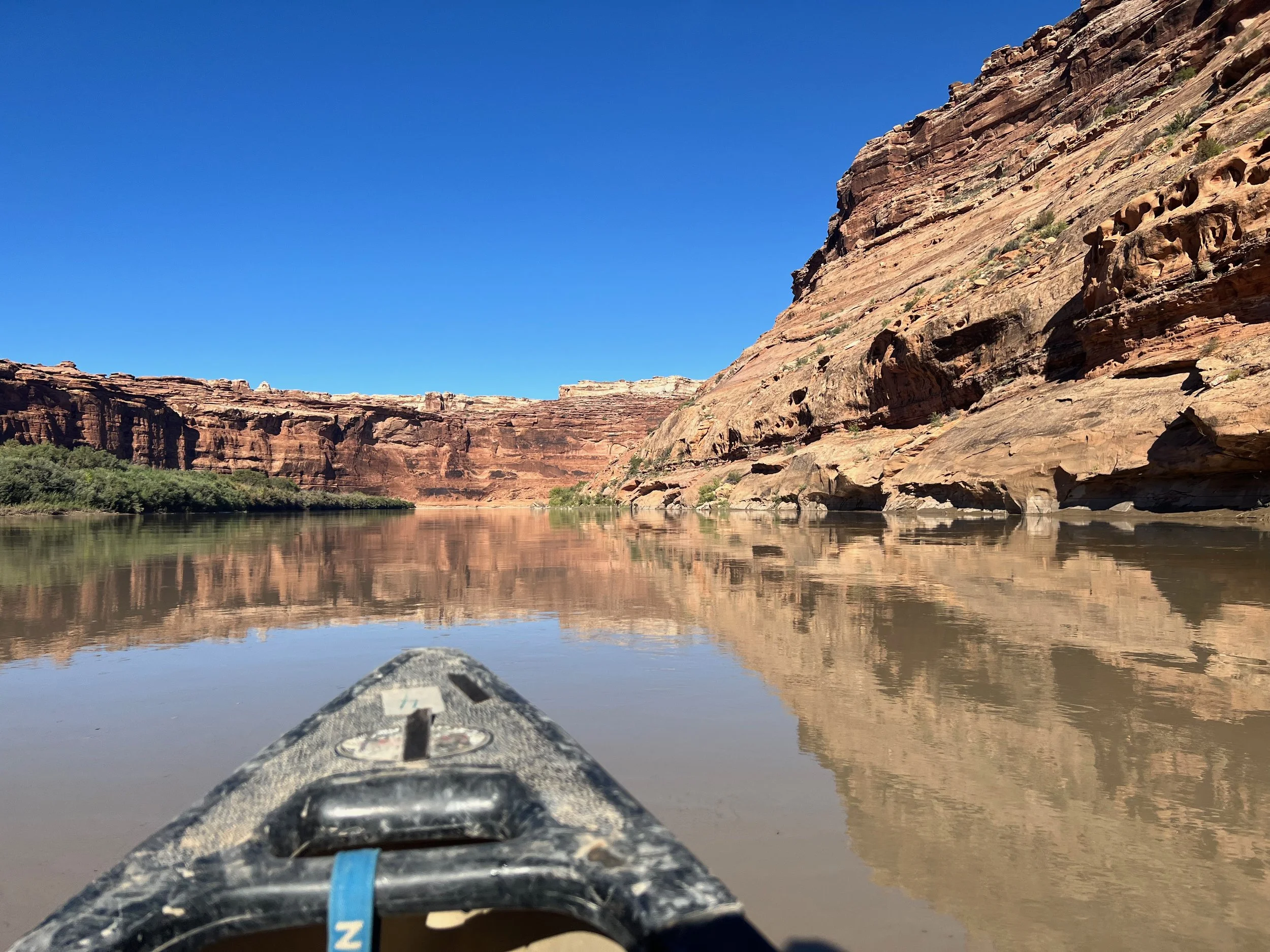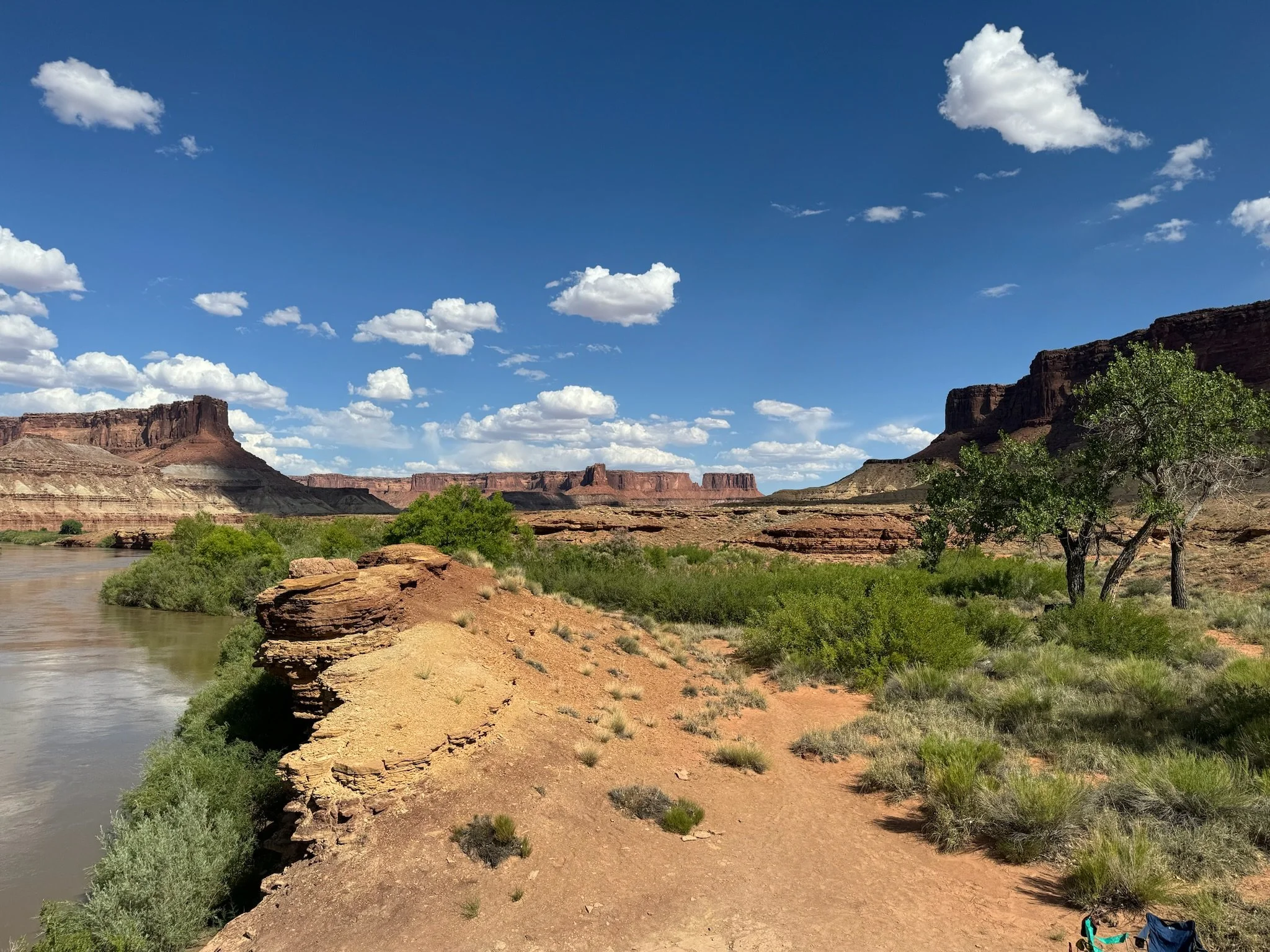
Restoring Resilience
A nature-based pause for changemakers and earth stewards
Green River, Utah
REGISTRATION IS NOW CLOSED
When was the last time you truly allowed yourself the gift of pause? The gift of rest? For those immersed in humanitarian, social justice, professional grief tending and climate change work, the demands can be relentless—physically, emotionally, and spiritually. How do we heal and practice internal activism when the weight of the world feels so heavy? When the urgency of crises calls for unceasing productivity? When we feel isolated in our despair and outrage at the state of things?
Green River Canoe Trip
September 26th - October 3rd 2025
7 days in a remote canyon setting, 45 miles of flat water paddling, 12 participants max
Guides: Eva Jahn, Elizabeth Johnson & Lauren Bond
Pricing:
EARLYBIRD by April 30: $2,450
Standard: $2,750
Still have questions? Join the guides for a free informal meeting on April 9th to get all your questions answered! Register at link below.
Registration is now closed.
Our emotional landscapes deserve as much care and attention as the external work we undertake. To sustain our activism—whether it’s nurturing climate warriors, writing songs, raising children, conducting research, organizing, gardening, educating or grief tending—we must also listen to our own inner stories.
This retreat offers a restorative pause on the stunning Green River, designed to help you reconnect with yourself, rebuild emotional resilience, and engage with a community of like-hearted participants. By fostering intentional connections with the more-than-human world (often referred to as ‘kinning’), you’ll discover spaces to rekindle your sense of purpose and possibility.
We’ll paddle along the river’s breathtaking waterways and plant our feet firmly in its ancient landscapes for practices that include:
Gathering circles and somatic anchoring
Reflective journaling, solo walks and relational practices
Gratitude and active hope exercises
A transformative 24-hour solo (kinning) experience, designed to reconnect you with “your wild and precious life.”
This landscape—rich with wonder, ancient history, and awe-inspiring beauty—will hold space for our griefs, frustrations, and active hopes. Together, we’ll create a sanctuary for healing and re-centering, enabling you to return to your work with renewed strength and clarity.
Take this soul-prioritizing pause to rekindle your connection to the world and embrace the resilience that lies within.
Meet the Guides
-

Eva Jahn, LPC (she/her)
FACILITATOR and GUIDE
Eva is the executive director and co-founder of the Climate Emotional Resilience Institute and a licensed psychotherapist working at the intersection of trauma, gender-based violence and climate distress. She is an international experiential educator and speaker and her work is influenced by studies in complex trauma and resilience, climate psychology, ecopsychology, neuroscience, nature-based and contemplative mindfulness practices, the Work That Reconnects and her multi-cultural background.
Eva is passionate about understanding the immediate mental health impacts of climate related disasters and long-term stressors of living with the reality of this polycrisis over time and how to move towards emotional resilience. Her love for rivers and the stillness and spaciousness that they provide, leads her to spend many weeks every year with the waters. Eva is has worked as a wilderness guide for many years and is both trained in swift-water rescue and WFR.
She believes that developing a consistent nature connection practice with elements of somatic awareness — integrating a sense of the sacredness of the land and her inhabitants — can foster reciprocity with the more-than-human world essential to our personal and collective well-being.
-

Elizabeth Johnson, MA (she/her)
FACILITATOR and GUIDE
Elizabeth is the co-founder and executive director of The Peaceful Presence Project, an Oregon-based nonprofit dedicated to cultivating community-centered death and grief literacy. With a Master’s degree in Community and Urban Planning, Elizabeth’s work explores the cultural, social, and ecological frameworks that shape human experiences of loss, transformation, and renewal. As a death doula and international educator, Elizabeth’s work draws upon The Work That Reconnects, focusing on building emotional resilience in the face of profound personal and planetary challenges.
She serves on the leadership council for Public Health Palliative Care International and is a graduate and current faculty member of the Anamcara Project, where she emphasizes grief as a pathway to resilience and ecological belonging. Elizabeth’s work is deeply rooted in her personal experiences with loss and her belief in the transformative power of sorrow, gratitude, and connection. Growing up amid the wild hills and rivers of northern Montana, she has always turned to the natural world as a source of solace, perspective, and intervulnerability.
-

Lauren Bond, MA (she/her)
LEAD GUIDE, River’s Path
Lauren is the founder of River’s Path, now in their 11th season, offering profound and transformational canoe journeys in Colorado and Utah. Their mission is to connect people with the natural world through immersive and educational canoeing experiences.
After dedicating her career and a master’s degree toward working in outdoor and environmental education, Lauren found there wasn’t space in her work for stopping, sitting down and becoming lost in conversation with an eagle or a waterfall. Canoeing rivers right outside her back door in Boulder was the perfect way to do that and the river retreats on the Green River in Utah are the culmination of her journey thus far.
Lauren has spent nearly 35 years of exploring rivers and streams, and nearly twenty guiding them. “We have guided thousands of people down the St. Vrain river and taken over 200 down the Green River. The gratitude I feel is indescribable. It is a joy for me to share the sacred havens of the river with you.”
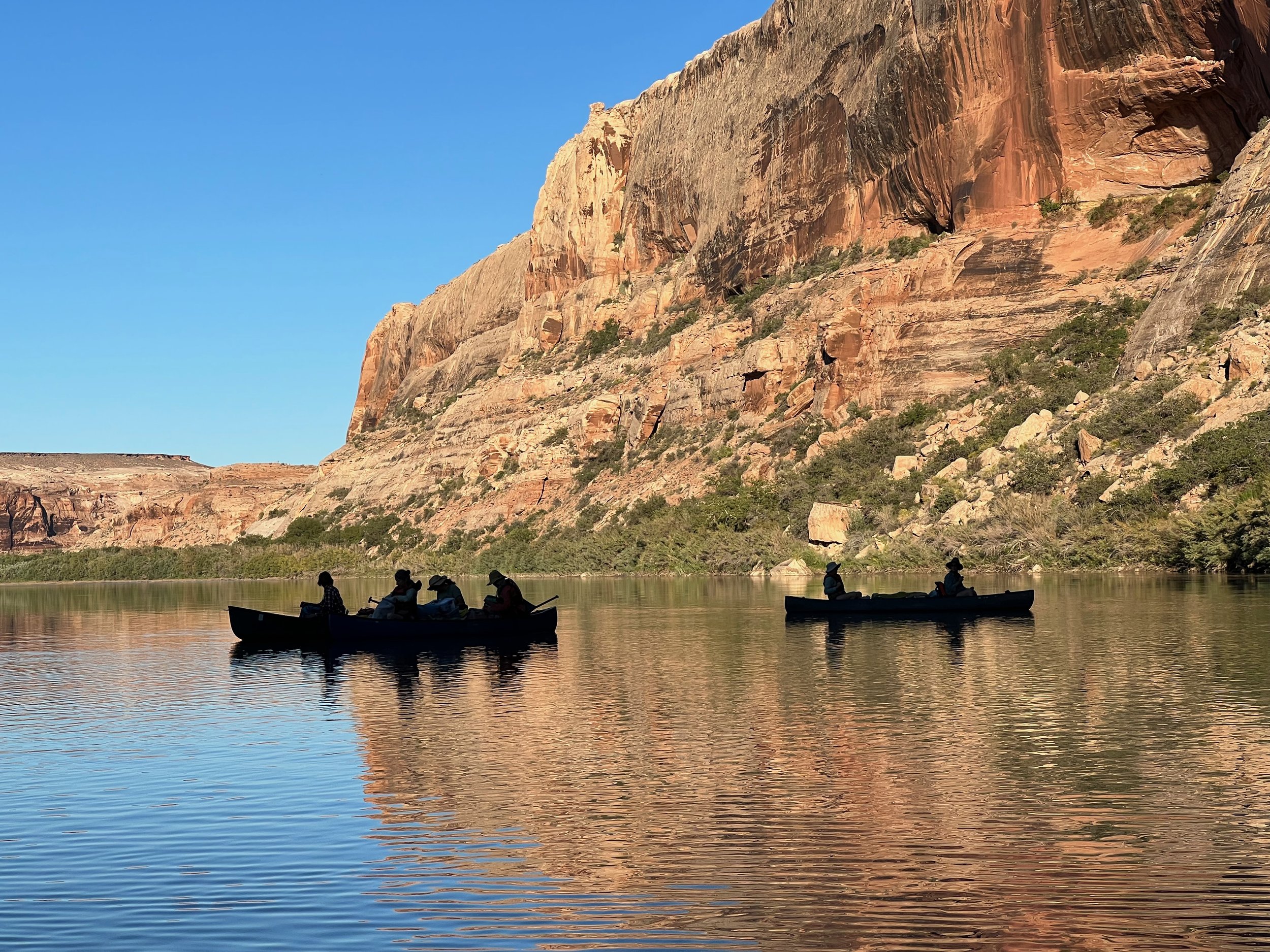
We welcome all…
who feel the weight and impact of this unfolding polycrisis in their personal or professional lives. Whether you’ve directly experienced a climate disaster, work daily with the realities of the climate crisis, or carry the heaviness of our changing ecosystems in your heart and body, this retreat offers a restorative pause to reconnect and renew. Our experience is designed to be inclusive and welcoming to all. No prior canoeing experience is necessary. Whether you’re new to the river or a seasoned paddler, all are welcome to join.
What to Expect – Overnight Canoe Trip on the Green River
-
We’ll canoe a total of 45 miles down the Green River through the steep canyon walls of Labyrinth Canyon in Utah. The trip begins at Ruby Ranch (located just south of I-70) to Mineral Bottom (located near Canyonlands National Park). Four to five days of paddling will be interspersed with layovers at wilderness campsites along the canyon. Paddle days are usually 7-15 miles each or about 3-5 hours of gentle paddling. The river has no rapids and hardly any current. It is muddy and shallow (except for high water in May and June)
-
While in camp, in addition to our theme program activity, we may swim, take short hikes or explore side canyons. After we all pitch in during camp setup, we’ll have plenty of free time to relax, enjoy our surroundings and have the opportunity to get to know each other as we experience the beauty around us. Then we’ll come together each evening around the campfire.
-
The River’s Path guided overnight canoe trips involve staying deep in the wilderness with no electricity or cellular reception, and in case of an emergency, evacuation will be done via rescue boat or helicopter. If you need to have medically necessary equipment that uses electricity or need to stay in contact with someone at home, the guides will have a texting device available. Please contact our outfitter and guide Lauren Bond with River’s Path at 303-859-7174 or lauren@theriverspath.org to discuss.
-
Temperature changes quickly and can be unexpected, so it is important to bring items from the packing list in case of any drastic changes. Rain and thunderstorms can pop up at any point. Temperatures for each month can range from the high 60s and low 30s for March to the high 100s and lows in the 70s for August. Please see the NOAA graph for Labyrinth Canyon monthly weather averages.
-
The section of the Green River we will be on is considered a Class I river with no rapids. This is essentially a flat water trip.
-
Each canoe accommodates two people and they include two Crazy Creek camp chairs with backrests. Canoes will carry all of the personal gear and camp supplies.
The River’s Path will supply 2 dry bags, one large and one small, for your personal gear.
Group gear provided includes: canoes, paddles, life jackets, canoe seat backs, camp chairs, full kitchen setup. Supplies provided include: all food, shade canopy and river toilet with a privacy shelter.
Your personal camp gear that you are responsible for includes: tent, tarps, sleeping bag, and anything else you need that is not provided. That being said, we highly recommend you approach this with a minimalist mentality. Everything you bring, along with your canoe partner, must fit on your canoe. We will supply you with a complete packing list.
While many adventurists kayak the Green River, the amount of gear, supplies, and coolers of fresh food on our journey requires canoes.escription
-
The River’s Path will provide food and drinks for all meals and snacks. We can accommodate most diets including vegetarian, vegan, paleo, gluten-free, and dairy-free. The water is too muddy for most portable water filtration devices, so we will pack all drinking water.
If you have other needs or concerns, contact the trip guide, Lauren Bond at 303-859-7174 or lauren@theriverspath.org
-
It’s important to note that this is a collaborative experience. To form a strong community and have an even more powerful, life changing, memorable experience, each individual in the group will participate and share in camp responsibilities. Everyone helps with setting up and taking down camp, unloading and loading canoes, cooking meals and cleaning up. Each individual must bring their own tent, sleeping bag and pad, as well as other items on the packing list. Those using a hammock must provide an appropriate setup for that.
-
During your trip through the Labyrinth Canyon you’ll find a slow meandering river with steep colorful canyon walls, amazing side canyons (and maybe evidence of ancient civilizations), incredible stars, unforgettable sunsets, and a hushed serenity you’ll find no place else. No matter where you look you’ll see the unforgettable and awe inspiring colors and sounds of nature.
-
You might consider long sleeved shirts and pants, bug lotion and head netting if you are extremely sensitive to bug bites. Birds like golden eagles, peregrine falcons, canyon wrens, screech owls, and more can be seen along with small animals like beavers and larger ones like desert bighorn sheep and deer.

